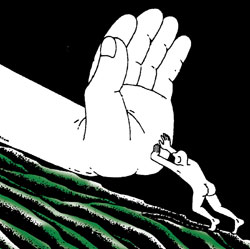 The political change in April 2006 was a revolt that reflected the Nepali people's mounting frustration with the lack of progress in political, social, and economic development of the country.
The political change in April 2006 was a revolt that reflected the Nepali people's mounting frustration with the lack of progress in political, social, and economic development of the country.
Yet, fifteen months after the event, one can't shake a feeling that things have slid back to the old ways. How to convert popular anger into good government?
Where will the sustained energy to establish transparency and accountability in politics and government come from? There are two: communities and leadership.
In Nepal, many community-based programs have delivered impressive development results: community forestry, women's groups, community-based rural drinking water programs, micro-hydro projects, community management of schools, and the Poverty Alleviation Fund.
This is not to say such programs have been free from elite capture and exclusion of certain groups, but overall results have been impressive. But such programs are critical not only for development in a narrow sense, but also for a more profound social transformation. In fact, that is probably why they work well. In a typical community-based program, a user group is formed. It receives a block grant from the government or a donor agency, mobilises its own resources, makes a collective decision on creation of public goods, and executes the project.
What fascinates me is that this is precisely what a local government is designed to do. The only difference is it seems to work even better, though on a much smaller scale. DDCs and VDCs have not been able to mobilise much in the way of local taxes, many user groups have been very successful in doing so. This difference is telling.
Many Nepalis are not sure their taxes will benefit them through public services. But, the members of many user groups are confident that their common investment will benefit them because they must feel they have the power to hold leaders accountable.
In short, such a user group is a functioning micro-government, and there are thousands of them across Nepal. At higher levels of government common citizens are still unable to overcome the old system of hierarchy and patronage. That should not be surprising in a society that is bound by centuries of feudal traditions. So, why not start the process of establishing democracy from where it actually works?
This is a central reason why the World Bank is prepared to support the government's new initiative to provide block grants directly to communities.
Imagine what would happen if those small villages of 20 to 50 households are allowed to 'federate,' or join with neighboring villages. Relatively large investments will become possible, and such federated units would quickly begin to resemble a local government.
Without ignoring the formal local government structure, Nepal can build on the strength of community level development efforts. This will inculcate a culture of democracy that will make formal local governments, when the new elections are possible, more effective.
I have often been critical of 'leaders' in Nepal. But there are also excellent leaders who have vision, integrity, and commitment. Their role is critical, and they can continue to provide the energy for sustained change. Nevertheless, they fight a difficult up-hill battle. Like in business, in politics too those who have the temerity to break rules to grab power tend to define the rules of the game and degrade the standards of behaviour. Many honest leaders simply do not gain positions of much power. Thus they seem wisely to have opted for working with the enormous energy for change in communities, rather than attempting to lead Nepal with a powerful vision and central authority to implement development programs.
If what transpired in April 2006 was about implementing deep reforms and creating a good government in Nepal, then the steadfast work and the smart leadership shown by reform-minded people of influence in politics, the civil service and elsewhere are really the people's movement. It is not flashy, but it will in time bring real change.
As I leave Nepal after serving six years, I do so with a sense of hope, because there is a real Jana Andolan underway in this country.
The author recently wound up a six-year assignment in Nepal as the World Bank Country Director for Nepal. He is currently the Bank's Country Director for Ethiopia and Sudan.



